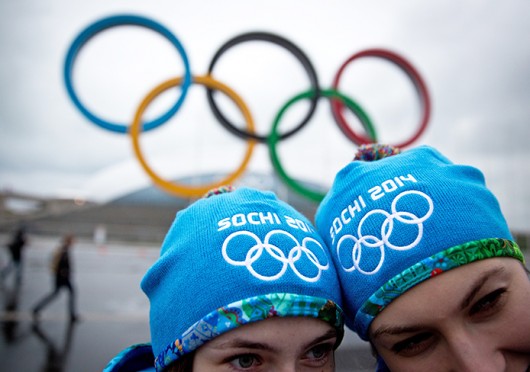
People pose for a picture under the Olympic rings at the Olympic Park in Sochi, Russia, Jan. 31.
Credit: Courtesy of MCT
While the Olympics are an exciting time for many countries, this year, one social element has sparked substantial debate: gay rights.
The 2014 Winter Olympics are taking place in Sochi, Russia. In Russia, though, there is a law permitting police officers to arrest anyone suspected of being gay or supporting gay people, a ban on spreading “propaganda of nontraditional sexual relations to minors” and a ban on the adoption of Russian children in any country where marriage equality exists.
Some organizations, though, have aired commercials or posted messages about the matter during the Olympics in protest of the Russian law.
Google was one of those organizations. It posted an excerpt from the Olympic Charter on its home page Feb. 6 in protest.
“The practice of sport is a human right. Every individual must have the possibility of practicing sport, without discrimination of any kind and in the Olympic spirit, which requires mutual understanding with a spirit of friendship, solidarity and fair play,” the excerpt read.
Angie Wellman, intercultural specialist at the OSU Student Life Multicultural Center and liaison to lesbian, gay, bisexual, transgender and queer students, said the Olympic games set an important example for others.
“I am hopeful that all of the competing Olympic athletes, their families and friends and others who are there are treated kindly,” Wellman said. “As young people watch these games, I hope they see role models they can look up to.”
The “playing field” has not always been a safe place for LGBTQ people, Wellman said.
“Men who participate in less masculine sports, such as ice skating and gymnastics, are often ridiculed as being weak or gay,” Wellman said.
Chris Bellman, a third-year in electrical and computer engineering and the leader of the student organization Fine By Me, one of the largest LGBT ally student organizations on campus, said relating the larger issue of discrimination to OSU is important because it could make more people aware of the problem.
“(Fine By Me members) try to make people who wouldn’t normally be aware of the LGBTQ community really stop and think about how the current laws affect those around them,” Bellman said. “I think the media coverage on this issue has probably made many people have those stop and think moments.”
Fine By Me aims to support the LGBTQ students on campus, Bellman said, which can be especially important for younger students.
“Many freshmen may be from smaller, less-accepting communities and we want to make them aware of how open and accepting the Buckeye community is on this issue,” Bellman said.
He added he’s been keeping an eye on the ads during the Olympics.
“I think it’s interesting that a lot of companies are subtly voicing their opposition to the Russian law by including LGBT couples in their ads,” Bellman said.
Allison Nichols, a second-year in international studies, said she doesn’t think Olympic athletes should be discriminated against.
“An Olympic level athlete puts hours of preparation and work in to get to this level and that should not be thrown out over a person’s sexuality,” Nichols said. “The Olympics is there for one to compete and be a citizen and spectate as a citizen of the world.”
Wellman said the younger generations watching the Olympics might be able to learn something from the men and women participating.
“I hope that the young men see the strength and vulnerability in the ice skating competition. I hope that the power and determination of the women’s hockey teams inspires another generation of girls,” Wellman said.


